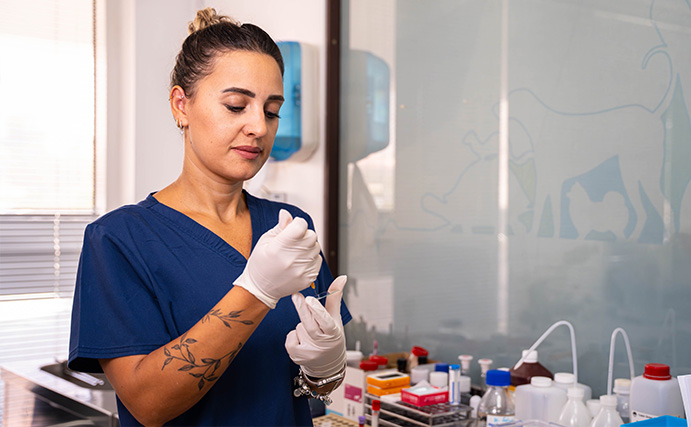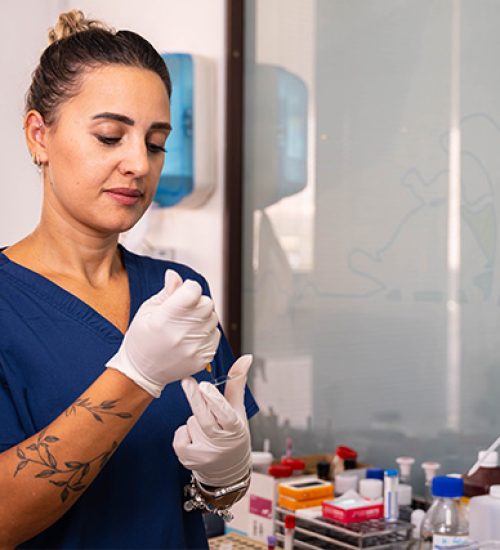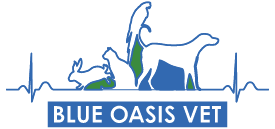Laboratory
With compassionate care and advanced testing capabilities at Blue Oasis Veterinary Clinic, we bring the highest quality service to your pets. In-house lab testing is one of the cornerstones of our clinical care, from routine checks to critical-care diagnostics. Our laboratory within our clinic identifies the silent causes of disease, tracks long-term health, and makes the safest treatment available directly in our care.
Differing from clinics that outsource their lab work, our in-house facilities enable immediate testing and quicker results so your pet can get the care they require when they need it the most.
Why is laboratory testing so essential for pets?
Lab testing is a cornerstone of today’s veterinary medicine. Physical exams and visual checks are important, but they have their limitations. Certain diseases, infections, and internal imbalances cannot be diagnosed merely through visibility. That’s where lab work comes in — they reveal the unseen aspects of your pet’s health, and your veterinarian can make accurate, sound, and timely decisions based on this evidence.
Blue Oasis Veterinary Clinic is committed to the belief that prevention starts with understanding, and understanding starts with testing.

Early Detection of Illnesses
Animals are masters at concealing evidence of pain or illness. By the time they do get symptoms, their disease might already be advanced. Tests such as blood work, urinalysis, and faecal exams can find changes before symptoms are evident.
- Recognise early kidney or liver dysfunction.
- Identify infection and inflammation signs.
- Detect hormone imbalances or parasites.
Early detection equates to sooner treatment, improved outcomes, and increased chances of healing.
Preventive Health Monitoring
Regular lab work acts as your pet’s health baseline. It tracks their health over time, particularly when they are:
- Annual or twice-yearly wellness exams
- Life Stages Transitions (puppy/kitten to adult and adult to senior)
- Breed-specific risk monitoring
These can reveal underlying changes in apparently healthy pets and enable early interventions to avert potential future problems.
Understanding Organ Function
Lab screens such as blood chemistry and complete blood count (CBC) provide a good view of the functioning of internal organs such as the kidney, pancreas, and liver.
- Is the number of cells in your pets blood normal?
- Is their kidney function adequately removing waste?
- Is the liver properly breaking down toxins?
This is especially significant before surgery or when prescribing ongoing medications. With unequivocal laboratory reports, your practitioner can effectively prescribe the best course of treatment, ranging from medicine to surgery to diet changes.
Tracking Current Conditions and Drugs
For those pets with chronic illnesses such as diabetes, kidney, liver, or thyroid disease, routine laboratory testing is essential.
Tracking disease progress ensures medications are effective and identify any negative side effects. Regular monitoring gives you and us the assurance your pet’s situation is being managed and changes can be made accordingly.

Types of Laboratory Tests Offered at Blue Oasis
At Blue Oasis Veterinary Clinic, we offer a diverse list of advanced diagnostic laboratory tests that assist in accurate diagnosis and treatment for your pet. From routine check-ups to emergency medical issues, our in-house laboratory enables us to provide quick and dependable results that assist us in making an informed decision for your pet’s treatment.
Complete Blood Count (CBC)
The Complete Blood Count, or CBC, is one of the most routine diagnostic tests in veterinary practice. It analyses red and white blood cell numbers and conditions, as well as platelet numbers, in your pet’s circulation. This test is important for diagnosing infection, anaemia, immune-mediated disorders, and infections or some cancerous diseases.
Blood Chemistry Panel
The Blood Chemistry Panel gives valuable insight into how your pet’s internal organs are functioning. It tests for liver and kidney health, glucose levels, and electrolyte and protein balance.
A blood chemistry panel is also important before an anaesthesia, to make sure it is save to anaesthetise the pet, and is also part of a geriatric pet’s age-related check-up to evaluate metabolic health.
Urinalysis
Urinalysis is done to check for diseases such as urinary tract infection, diabetes, bladder stones, and renal disease. The test analyses your pet’s urine colour, clarity, density, and chemistry.
Cytology
Cytology is a diagnostic technique where single cells are viewed under a microscope to check for abnormality. A sample can be obtained from a skin mass, an ear swab, or a body fluid. This diagnostic method is useful specifically for detecting infection, inflammatory processes, and determine the type of a tumour. It enables us to rapidly make treatment plans, particularly for suspicious lumps, skin diseases, or recurring ear infections.
Thyroid Hormone Testing
Thyroid hormone tests check T4 and other important hormones involved in thyroid function. In dogs, low levels of thyroid hormones (Hypothyroidism) can results in symptoms such as weight gain, drowsiness, and hair loss. Conversely, cats are susceptible to Hyperthyroidism (elevated thyroid hormone levels), which results in weight loss, and hyperactivity. Diagnosis and management of these endocrine conditions rely heavily on thyroid testing.
Frequently Asked Questions
Results from most in-house tests at Blue Oasis take anywhere from minutes to an hour. This quick turnaround allows for prompt diagnosis and treatment when required. To perform some special tests we have to send the sample to our partnering specialised lab, results will take a bit longer, but we always keep you posted about when you can expect them and what comes next along the way.
Lab work for pets is typically low-stress for them. Our skilled staff will withdraw blood in a fast and almost painless procedure. Sedation will rarely be required and will be reserved for anxious or uncooperative pets. Your pet’s comfort and well-being always come first when we perform any procedures, making for a relaxed experience.
Pre-anaesthetic blood test is important to evaluate your pet’s overall health before anaesthesia. It tests vital organs for proper functioning and reveals latent conditions that may exacerbate the minimal, but always existing, anaesthetic hazards. With these tests, we’re able to customise anaesthetic procedures and enhance safety, enabling your pet’s recovery from surgery without issues.
Yes, wellness lab work can find early indications of illness even when your pet isn’t showing symptoms, providing important information about your pet’s health. Having baseline information allows for monitoring for changes, making timely treatment and prevention possible. Regular testing facilitates overall well-being, particularly for seniors or pets susceptible to health concerns.
Should your pet’s test have abnormal results, our veterinarian will describe them in layman’s terms to you and outline potential causes. Further diagnostics might be suggested or relying on the findings, we will develop an individualised treatment solution for your pet’s exact requirements, working as fast and efficiently as possible for optimal results.



